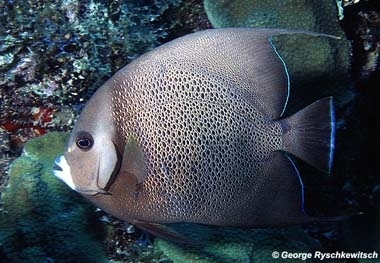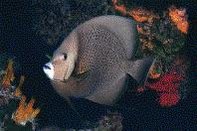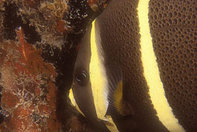Gray angelfish (Ecology)
Contents
Gray angelfish
The gray angelfish (scientific name: Pomacanthus arcuatus) is a member of theangelfish family (Family Pomacanthidae) that lives on coral reefs in the Atlantic and Pacific Oceans.
|
Scientific Classification Kingdom: Animalia (Animals) |
Physical Description
Gray angelfish adult individuals range from 25 to 60 centimeters in length. Their laterally compressed, round bodies are grey and they have yellow on their pectoral fins. Juveniles are black with three bright yellow bars.
Distribution
They are found in the Western Atlantic from New England, USA to the vicinity of Rio de Janeiro, Brazil, the Gulf of Mexico, and the Caribbean Sea (Caribbean Sea large marine ecosystem). In the Eastern Central Pacific they are found in the Hawaiian and Johnston islands.
Habitat
They live on coral reefs at depths ranging from 12 to 183 meters, but they are more often found between 25and 50 meters.
Feeding Behavior
Gray angelfish feed mainly on sponges (about 70% of their diet) as well as algae, hydroids, tunicates, zoantharians, gorgonians, bryozoans, seagrasses, and eggs. Angelfish have adaptations to allow them to feed on sponges. Their strong mouths allow them to tear off pieces of sponges and they secrete mucous around their food to protect their stomachs from the sponges spiny spicules. Juvenile gray angelfish may act as cleaners.
Behavior
Gray angelfish feed on the reef throughout the day. Usually they travel alone or in pairs. Males form territories to defend their mates from other males.
Reproduction
Gray angelfish may reproduce year around. They are thought to form monogamous pairs that may result in forming long-term bonds, but some may be promiscuous as well. Spawning occurs at sunset when a single male and female rise above the reef to release gametes. After the eggs hatch 15 to 20 hours later, the larvae enter the pelagic stage for three to four weeks until they settle in shallow water and transform into juveniles.
Associations
Juvenile angelfish may act as cleaners.
Conservation Status
Gray angelfish are not deemed to be a taxon at risk.
References and Further Reading
- Encyclopedia of Life. species curator: C.Michael Hogan. 2011. Pomacanthus arcuatus (Linnaeus, 1758)
- Florida Museum of Natural History. GrayAngelfish
- Fishbase. Pomacanthus arcuatus Gray Angelfish
- P.Humann and N.Deloach (Editor) 1994. Reef Fish Identification: Florida, Caribbean, Bahamas. New World Publications, Inc. Jacksonville, FL. ISBN: 1878348078
- N.Deloach. 1999. Reef Fish Behavior, Florida, Caribbean, Bahamas. New World Publications, Inc. Jacksonville, FL. ISBN: 1878348280


